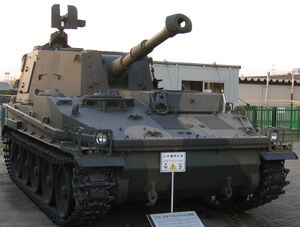Engineering:Type 74 105 mm self-propelled howitzer
From HandWiki
| Type 74 105 mm self-propelled howitzer | |
|---|---|
 Type 74 displayed at the JGSDF Public Information Museum | |
| Type | Self-propelled howitzer |
| Place of origin | Japan |
| Service history | |
| In service | 1975-1999 |
| Used by | Japan |
| Production history | |
| Designed | 1969-1974 |
| Produced | 1975-1978 |
| No. built | 20 |
| Specifications | |
| Mass | 16,500 kilograms (16.2 long tons; 18.2 short tons) |
| Length | 5.8 metres (20 ft) |
| Width | 2.9 metres (9 ft 6 in) |
| Height | 2.39 metres (7 ft 10 in) |
| Crew | 4 |
| Shell | separate-loading |
| Calibre | 105 millimetres (4.1 in) |
| Traverse | 360° |
| Muzzle velocity | 645 m/s (2,120 ft/s) |
| Maximum firing range | 14.5 kilometres (9 mi) |
| Armour | aluminum |
Main armament | 1x 105 mm JSW howitzer |
Secondary armament | 1x 12.7 mm M-2HB machine gun |
| Engine | Mitsubishi 4ZF V-type 4-cylinder diesel 300 brake horsepower (220 kW) |
| Power/weight | 18.4 hp/t (13.7 kW/t) |
| Transmission | manual |
| Suspension | torsion bar |
| Ground clearance | 40 centimetres (16 in) |
| Fuel capacity | 410 litres (110 US gal) |
Operational range | 300 km (185 mi) |
| Speed | 50 kilometres per hour (31 mph) |
The Type 74 105 mm self-propelled howitzer is only used by Japan. It shares a number of automotive components with the Type 73 Armored Personnel Carrier which was developed during the same time. Komatsu developed the chassis, while the howitzer and turret were designed by Japan Steel Works. The first prototypes were completed in 1969–1970. The howitzer was accepted for service in 1974.
It carries 30 rounds on board. It is amphibious when using the erectable flotation screen stowed around the periphery of the upper hull. It is equipped with an NBC filtration system.
Type 74 was attached to 117th Artillery Battalion in Hokkaido. In 1999, all Type 74s were retired and the battalion was disbanded.[1]
Notes
- ↑ "Type 74 105 mm self-propelled howitzer (Japanese)". Combat-Nekomaru's Tank Laboratory. http://combat1.sakura.ne.jp/74SHIKIJ.htm. Retrieved 13 March 2020.
References
- Chant, Christopher. A Compendium of Armaments and Military Hardware. New York and London: Routledge & Kegan Paul, 1987 ISBN:0-7102-0720-4, p. 76
External links
 |

